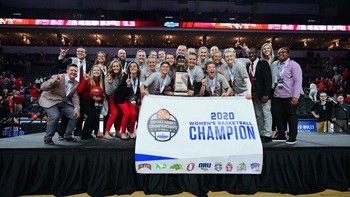USD student recognized for outstanding undergraduate research at Sanibel Symposium
Sapp, a senior chemistry major, is a relative newcomer to the field of computational chemistry. She co-presented a poster with fellow undergraduate Adam Erck, which highlighted their results on “Computational approaches to understanding host-guest interaction of metal-organic super containers.” This research project stems from Rick Wang’s experimental research on supercontainers, including the identification of interesting guest-binding capabilities. Wang is an assistant professor of chemistry. Sapp’s research, which is part of Dmitri Kilin’s research group of eight students, is focused on explaining these binding characteristics.
Kilin, Ph.D., who joined the chemistry department in 2010, teaches advanced physical chemistry classes at USD to graduate students, but this fall he will add an undergraduate computational chemistry course to his teaching repertoire. The class material is focused on time resolved issues of quantum theory as a background allowing to interpret or to predict an outcome of a measurement. As a part of the course, students complete an independent research project and publicly advertise their results through YouTube videos. Kilin received his Ph.D. in physics from Chemnitz University of Technology in 2000.
For more information about the Sanibel Symposium, please visit www.qtp.ufl.edu/sanibel.


